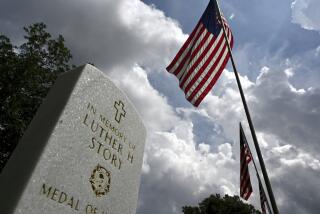Brother’s Keepers Obtain His WWII Medals
- Share via
The last time Victor Muller saw his brother was in August 1944. Joseph Muller, who had been drafted and was shipping out for France, had driven up to Victor’s summer camp in the Catskills to say goodbye and deliver his first and last man-to-man chat. Take care of Mom and our two sisters, Joseph told his 8-year-old brother. You’re a man of the house now.
On Sunday, as wind whipped across the airfield at the Los Alamitos Joint Training Center, Victor Muller completed what he viewed as one of the final responsibilities conferred on him nearly 60 years ago--to take care of family. Muller finally got his brother what he thought was due him from the U.S. Army. With his two older sisters at his side, Muller accepted six medals in his older brother’s name, including a Bronze Star and a Purple Heart.
Muller said his brother was awarded the Bronze Star for outstanding service in the infantry in a number of battles.
The medals were a long time in coming. They were awarded only after Muller lobbied the Army for more than a year, urging them to recognize the heroism of the anonymous young private who was shot down in the February snows of southern Germany, much of his war records either lost in the confusion of battle or burned in a fire decades later.
“It’s a little closure,” said Muller, 65, a retired architect who lives in Mission Viejo.
He passed the blue plastic cases to his sister, Ethel Merenyi, 79. The shiny Bronze Star glinted in the bright Southern California sun as all around them, fighters in the new 21st century Army celebrated an annual Family Day, hoisting babies into the air and chatting on cell phones.
In today’s Army, many are preoccupied with stealth bombers and Special Forces in Afghanistan. But Joseph’s siblings were picturing the lonely foxholes dug into the ground across Northern Europe, and the 90 yellowing letters, written in careful longhand, which are all they have left of their beloved Joseph.
“Oh yes, he deserved it,” said Ethel, who lives in Laguna Hills.
Joseph Muller was the oldest child, the pride and joy of this immigrant family--ethnic Germans who came from Hungary and settled on East 89th Street in Manhattan.
For his younger sister Ethel, Joseph always had a spare dime so she could go the movies. Once, he took her to Radio City Music Hall to see the Rockettes. In the bathroom, he found a diamond ring near the sink and promptly turned it in to the management.
Victor Muller, 19 years younger than Joseph, has few memories of his brother, but what he does recall is etched into his heart in such vivid detail that he can close his eyes and see the scenes unfolding in his mind. He remembers his brother’s final visit to his summer camp. Victor had just stolen a pear off a nearby tree, and when a uniformed figure called his name, he quaked in fear, and then felt joy spreading as his brother, dressed in his Army uniform, approached.
He remembers the mixture of bitterness and pride he felt when, at 18, he was stationed in West Germany during the Korean War and went to Luxembourg and saw his brother’s grave.
Around the time of the 50th anniversary of D-day, Victor, a grown man with a daughter and a son and a successful career as an architect, began to hunger for more details about his brother’s last months.
How did he die? What did he do? Where was he?
Starting on the Internet, Victor Muller found contacts that eventually led him to fly to a military memorial in Luxembourg. There he got an address for the 80th Infantry Division. He sent off a batch of letters, enclosing an aging sepia photo of Pvt. Muller, beseeching the veterans for information.
A week later, the phone rang. An old man was on the other line. He hadn’t known Pvt. Muller well, but remembered the name and face from a brief conversation on a truck ride near the German front.
Other members of the 80th Infantry Division wrote long letters back. They didn’t remember Pvt. Muller, but they urged his younger brother to continue his quest. And they told him that Muller deserved the Purple Heart and the Bronze Star, and almost ordered Victor Muller to keep pushing the Army until he got them.
Two years later, Muller got what he was searching for: six medals, two badges and, on Saturday--just the day before the ceremony--a letter informing him that Joseph Muller had been posthumously promoted to private first class.
On Sunday afternoon after the ceremony, Joseph Muller’s three siblings went out to lunch to celebrate their brother’s honors.
“I want you to know, we are equally proud of my little brother,” Ethel said. A few minutes later, she sighed. “I am happy and sad, both at the same time. . . . I don’t know why there has to be wars.”
More to Read
Sign up for Essential California
The most important California stories and recommendations in your inbox every morning.
You may occasionally receive promotional content from the Los Angeles Times.










